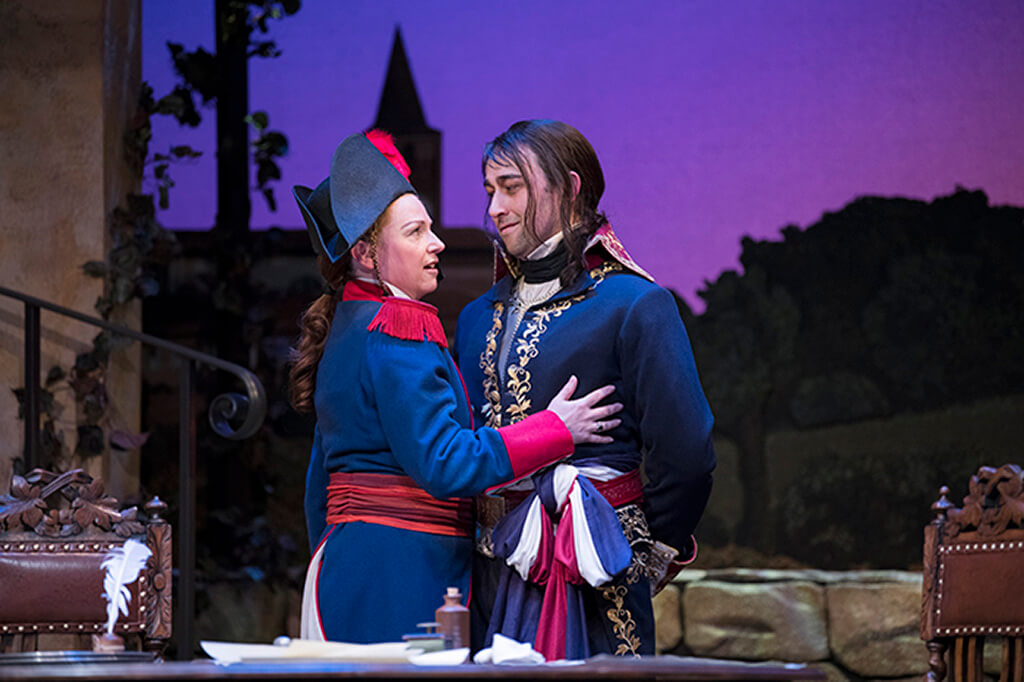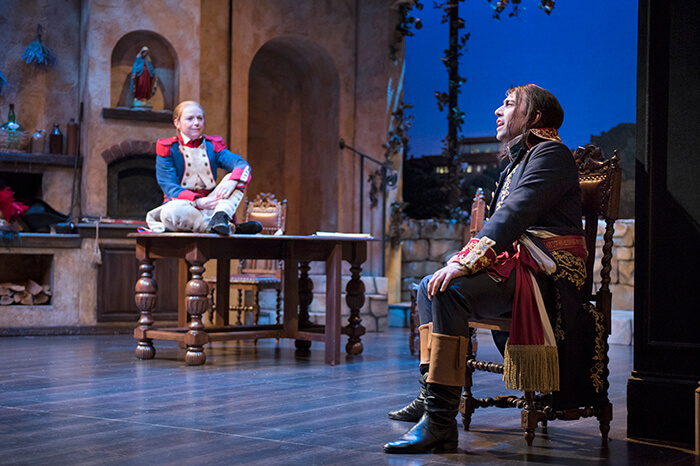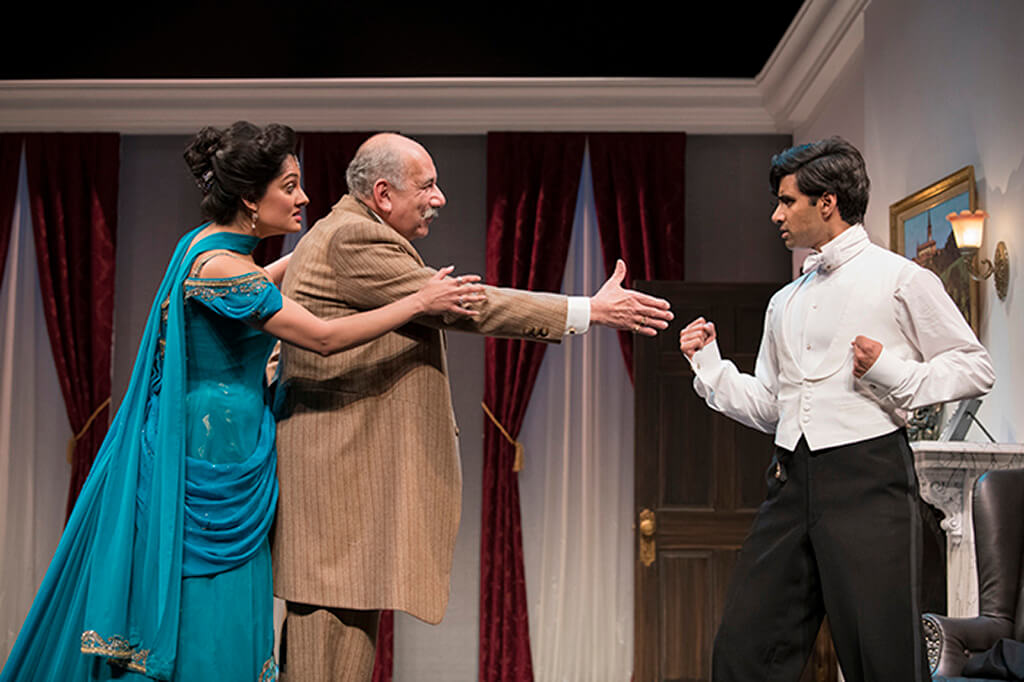
Shaw Festival 2018/ Of Marriage and Men: A Comedy Double-Bill (How He Lied to Her Husband and The Man of Destiny by George Bernard Shaw, directed Philip Akin, Royal George Theatre, May 13 to Sept. 9. Tickets available at 1-800-511-7429 or www.shawfest.com
NIAGARA-ON-THE-LAKE — Since this is the Shaw Festival, it behooves one to review the Shaw plays. This year, however, there is a dearth of them. In fact, there is only one mainstage production and the lunchtime theatre. (Unfortunately, the latter was not being performed on the day I attended the festival). Thus, with only one possible Shaw outing, it had better be a good one, and to a very large extent, it is.
The umbrella title is Of Marriage and Men: A Comedy Double-Bill, and comprises of two one-acters: How He Lied to Her Husband and The Man of Destiny. Putting these two plays together is not the whim of Shaw artistic director Tim Carroll. The always excellent Shaw program notes tell us that the playwright intended them to be a pairing. It seems that The Man of Destiny (1897), about an hour in length, was too long to fit with full-length plays, and too short to be billed on its own. (Wouldn’t Shaw be surprised at all the one-hour plays filling our boards today!) He, therefore, tossed off the half-hour How He Lied to Her Husband in four days for New York producer/actor Arnold Daly in 1904, who was the first to present them together.
Obviously, the two plays are about marriage and men. The three-hander, How He Lied to Her Husband, revolves around a married woman, She (Herself), whose young admirer, He (Her Lover), has written passionate love poems to her which have been misplaced. She is certain her evil sister-in-law has given them to Her Husband, and she wants He to lie and say they weren’t written to her. The more substantive The Man of Destiny finds Napoleon on his Italian campaign in 1796. His courier has been robbed of important dispatches. The thief, it turns out, is a woman disguised as a soldier, who is only interested in a private letter among the dispatches. Her friend, whom we come to realize is the morally questionable Josephine, has begged her to steal the letter so that her husband Napoleon won’t read it. Apparently, it contains news about a scandal and a duel. Incidentally, the set change between the two plays is one of the most clever I’ve seen in many a day, and kudos to director Philip Akin for his vision. I don’t want to give anything away so I will say nothing more about it.

There are four characters in The Man of Destiny — Napoleon (Kelly Wong), Strange Lady (Fiona Byrne), Giuseppe, the innkeeper (Martin Happer), and the courier Lieutenant (Andrew Lawrie). Wong, Byrne and Happer have, collectively, 39 seasons between them, so they are old hands with negotiating through Shaw’s tortuous torrent of words. In his second season, Lawrie certainly holds his own in terms of language. Director Akin has ensured that the wit and wisdom of Shaw comes through by a crisp cadence and delivery. Shaw’s plays have to be spoken with speed, but not so fast that it becomes one giant, garbled rush of impenetrable speech. In Akin’s production, the ideas come flying off the stage and luckily, we, don’t miss a single one, whether it is Napoleon’s very clever description of the English being a dangerous nation of shopkeepers, or Giuseppe’s pragmatic explanation as to why he has no ambition to be anything other than an innkeeper.
Sometimes it is easy to perform Shaw like a cipher. The audience will still get Shaw’s meaning and motivation for writing the piece, but it will be at the expense of character, and I’ve often felt that the loss of the humanity behind the language is a frequent weakness of Shaw performances. Happily, this is not the case here. In fact, the production is rich in characterization, which has clearly been a focus for Akin.
Wong has been around for ten years, always able and competent, but he is a real standout here, in fact, a genuine revelation, as if the role has allowed him to burst out of his shell. (Good on Carroll for giving him this casting opportunity.) Napoleon is referred to by Strange Lady as a Corsican adventurer, and Wong portrays him as both vulgar and commanding. Vulgar in the way he sits lolling about in a chair, legs apart, arms wide-spread, or how he messily slurps his spaghetti, or how he carelessly sports his rumpled state of dress and unkempt hair. But, he is also commanding in his sharp, direct and at times brutal comments that show not one shred of empathy, particularly to his hapless lieutenant. His treatment of Strange Lady is certainly not that of a gentleman. This is a man whose bark and bite are equally scary, a general who is secure in his power, but, and here’s the kicker, though vulgar and a bully he might be, he is also very charismatic and very sexy. Wong’s Napoleon is a most alluring bad boy.
Byrne is good at playing feisty, and her Strange Lady both stands up to Napoleon while trying to manipulate him at the same time. Byrne slides effortless from tactic to tactic – fearful and helpless, sly and cunning, angry and aggressive — but all through her machinations, she is consummate charm and grace, even when disguised as a man. The erotic tension that builds between her and Napoleon is palpable, and you know when the play ends that the nearest bed and sex are just around the corner. Happer, replete with a very convincing Italian accent, is excellent as the oleaginous innkeeper, a man who will always survive. The actor finds just the right amount of obsequiousness cocooned in self-confidence. Lawrie as the young lieutenant, is at once pompous and naïve, easily duped, yet endearing in his righteous indignation. The Man of Destiny is a gem of a production on every level.

How He Lied to Her Husband is a bonbon, a frippery, an amuse-bouche of a curtain raiser. It’s a what’s-not-to-like fluff of entertainment, which is not to say that it is totally without depth. He/Henry (Shawn Ahmed), who fancies himself a poet, believes that he must save She/Aurora (Krystal Kiran) from her prosaic, businessman older husband Teddy (David Adams). Shaw has fun with the surprise twist of the plot which is at the core of the play — that the husband becomes angry when Henry denies writing the poems to Aurora, insulted that the poet thinks that his lovely young wife is not good enough to be adored and admired. There is also a witty Shavian inside joke. The characters make several references to having seen a production of Shaw’s Candida (1894), which basically is the same plot as How He Lied to Her Husband. The young poet Eugene Marchbanks wants to take Candida away from the drudgery of her ordinary life with her complacent clergyman husband, James Morrell. The play was very controversial because of its attack on marriage and perceived immorality, which makes for a delicious bit of irony in How He Lied to Her Husband.
Reliable, experienced Adams is the most comfortable on the stage, and while Ahmed and Kiran are more mannered and a trifle stiff, there is good news. Both promising young actors are in their first Shaw season. In this production, they prove that they can cope with the Shavian language, and it is certain that their talents will carry them far. They exude personality.
Finally, we have to mention Steve Lucas’ wonderful set and lighting design, and Tamara Marie Kucheran’s costumes. The two plays are totally different in time and place. Lucas has produced a gorgeous South Kensington flat that is the height of glamour, in contrast to a quaint, rustic Italian inn. His slow fade in The Man of Destiny from bright sunshine, to sunset, to dusk, to twilight is divine. Kucheran has superbly crafted both eighteenth-century military and peasant dress and Edwardian finery. Her bright, turquoise evening gown for She (Herself)/Aurora is absolutely ravishing.
- INTERVIEW | Actor Diego Matamoros Takes On Icon Walt Disney In Soulpepper Production Of Hnath Play - April 16, 2024
- SCRUTINY | Opera In Concert Shine A Light On Verdi’s Seldom Heard La Battaglia Di Legnano - April 9, 2024
- SCRUTINY | Lepage & Côté’s Hamlet Dazzles With Dance And Stagecraft Without Saying Anything New - April 5, 2024



